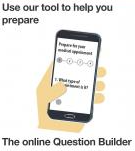Overview
There are many professionals who offer support to people experiencing mental ill health. For example, GPs, psychiatrists, psychologists, social workers, occupational therapists, mental health nurses, dietitians and physiotherapists. Sometimes it helps to try a few different types of support or a combination before finding what works best. Support may be short or long-term. With all types of professional support, the aim is to offer new ways to deal with symptoms, improve symptoms, and help you feel better about yourself.
Choosing the right professional
Finding the right mental health professional is very important as this new relationship can have a big impact on positive outcomes. While a particular mental health professional may be a good fit for a friend or family member, they may not be the right person for everyone. Before choosing who to see, you should feel clear about what you need and expect from the health professional.
Questions to ask
Knowing what to ask will help to decide on the right professional to see. Examples of questions to ask include:
- Do I need a referral to see you?
- How soon can you see me?
- How can you help me?
- How do you work (one-to-one, in groups, with family)?
- How often will I need to see you?
- What results can I expect?
- How much do you charge?
- How much will I get back from Medicare?
- Do I have to pay if I cancel my appointment?
- Where are you located?
- Are appointments available on days or time that work for me?
- Can I have telehealth appointments?
It may also be important to ask about gender or sexuality if you have a preference, and what languages are spoken if English is not your first language.
As well as the above questions, the Health Direct Question Builder can be used when getting ready to speak to a GP or a psychiatrist.
Types of professionals
The type of professional you see will depend on your individual circumstances. See the descriptions below for more details about each profession.
General practitioners
General Practitioners (GPs) are medical doctors who have completed extra training in general practice. This means they have a broad knowledge of health issues and are qualified to treat people of all ages. Your GP is a good place to start if you are concerned about your physical or mental health. They can coordinate your health care and look after you long-term.
If you have concerns about your mental health, your GP can make an assessment and, if necessary, create a mental health treatment plan, refer you to mental health professionals, prescribe and monitor any medications and manage all of your ongoing health needs.
Psychiatrists
A psychiatrist is a specialist medical doctor who assesses and treats persons experiencing a mental health condition. They can complete a mental health diagnosis and work out an appropriate way to help you. This may include psychotherapy (talking therapy) and prescribing medication. When working with you, they will explore broader social and cultural factors that might be affecting your thoughts and behaviour in order to help make changes to improve daily wellbeing. Psychiatrists may talk with your family members and others, such as your carers. Psychiatrists often work in collaboration with general practitioners and other health professionals to best meet your mental health and emotional needs.
Psychologists
Clinical psychologists are trained to assess and diagnose mental health conditions though they’re not allowed to prescribe medication. Psychologists use psychotherapy (“talking” therapy) to help you improve your mental health. Psychologists are interested in knowing about the difficulties you’re experiencing, how long these have been happening and how they are affecting your day-to-day life. Psychologists will ask questions about your past and encourage you to talk about your thoughts, feelings and behaviours. They will suggest ways to cope with the difficulties being experienced.
Social workers
Social workers do not diagnose mental health conditions but they work with you and your family, friends or carer to figure out what kind of support you need. They use talking therapy and they help you to find ways to manage things like housing difficulties, employment challenges and relationship problems. They also offer support for drug and alcohol problems. The social worker’s aim is to help put in place a plan for you to get well and stay well.
Occupational therapists
Occupational therapists (OTs) help people with a mental health condition to manage practical, everyday tasks and figure out ways to get things done. This may include help with organising (for example, planning, shopping and cooking a meal), prioritising tasks and keeping track of what needs doing, and engaging in social activities. OTs also show ways to keep calm when you feel overwhelmed by too much information or unsettled by your surroundings. OTs can provide strategies to calm an anxious mind and body and respond effectively to distressing or challenging emotions.
Mental health nurses
A mental health nurse is a registered nurse who has taken extra training to work in the area of mental health. Mental health nurses work closely with other health professionals to provide the best level of care to you. The nurse may help to put care plans into place, manage medication, ensure you’re receiving the help you need, support your family members and offer education about mental illness to the community.
Dietitians
Dietitians help you work out the right kinds of food to eat. Certain medications can cause side effects such as weight gain, tiredness, stomach pains, or skin irritations. A dietitian can recommend which foods to eat to make you feel better and maintain good physical and mental health.
Physiotherapists
The role of the physiotherapist is to help with your physical health, which has flow on benefits to better mental health. Physiotherapists help with aches and pains in the body such as joint problems, neck pain and back pain, tendon and bone injuries. The physiotherapist’s focus is on wellbeing and on helping people to maintain the right level of physical activity and exercise. Exercise releases chemicals from the body that improve mood. It can also improve sleep, memory, learning and reduce stress. Physical health and mental health are closely related. Your mental health can be significantly affected by physical health problems, and when you’re experiencing mental health issues you may find your physical health suffering.
Where to find a professional
Professionals provide support to people experiencing a mental health condition in hospitals, community-based health services, private practice, and schools. Social workers also work in employment services, housing and disability services.
Community and hospital-based
- If you need immediate care, you can go to the Emergency department of any hospital. Professional support will be provided to you, and you can request follow-ups as an outpatient of the hospital.
- Private psychiatric hospitals provide specialised psychiatric care to people of any age with mental illness.
- Child and Youth Mental Health Service (CYMHS in Qld and Victoria) or Child and Adolescent Mental Health Service (CAMHS in NSW, SA, WA and Tasmania) offers support to people up to the age of eighteen years.
- Headspace provides mental health support to people aged 12-25 years.
- There are support services for young people with eating disorders in every State and Territory.
- The Australian Indigenous HealthInfoNet offers a map of services for Aboriginal and Torres Strait Island people
Other services available would depend on where you live and the type of mental illness you’re experiencing. The services include crisis or mobile assessment and treatment services, day programs, outreach services, residential mental health services and supported housing places for people affected by mental illness. A GP or health professional in a hospital or community-based service can provide information about how to access these services. See also the National Services Directory and the links below for more information.
Private practice
If you’re over twenty-five years, regular, ongoing support for your mental health is mainly accessed by seeing professionals in their private practice. Psychiatrists, psychologists, occupational therapists, social workers, dietitians and physiotherapists work in private practice. Links for finding a professional in private practice are provided below. In many cases, there will be a cost for these services. Always ask the health professional about their fees before making an appointment. (More information is provided below about cost.)
Professional support can be found by asking a GP or by using the following options:
- Psychiatrists: Before seeing a psychiatrist, a referral letter is needed from a GP. The GP can help find a psychiatrist that specialises in the area you need help with. Another option is to search for a psychiatrist through Your Health In Mind and HealthShare.
- Psychologists: Psychologists can be contacted directly for an appointment, though it is cheaper if you have a Mental Health Treatment Plan from a GP. The GP may suggest a psychologist, which may be located through the Australian Clinical Psychology Association.
Social workers, occupational therapists, dietitians and physiotherapists who work in private practice can be can be contacted directly for an appointment. If the GP has written a Health Care Plan, these services might be bulk-billed.
- Social Workers via Australian Association of Social Workers
- Occupational therapists via Occupational Therapy Australia
- Dietitians via Dietitians Australia
- Physiotherapists via Australian Physiotherapy Association
What can I expect?
The health professional will want to know why you have come to see them. They will ask questions to find out what sort of difficulties you’re having. They may ask questions about your thoughts, feelings and behaviour. They will do an assessment of your needs (for example, a physiotherapist may ask you to perform certain movements or simple exercises, a social worker may ask if there are any housing or employment problems).
The health professional will then outline a treatment plan, that is, things they can offer you. They may also ask if it is alright to talk to other professionals involved in your care.
What are my rights?
To assess and offer the best support, health professionals need to ask very private questions and may want to share information about your mental health, assessment findings or treatment plan with other professionals who are involved in your care. Consent should be obtained before information is shared and you have the right to say no.
People accessing voluntary supports have the right to stop seeing the professional at any time.
In a situation where you’re at imminent risk of serious harm and have chosen to discontinue treatment, psychiatrists may have the legal right to continue your treatment. If you become a patient involuntarily, the psychiatrist is legally and ethically responsible for ensuring your rights are protected at all times.
To learn more about your healthcare rights click below.
How much does it cost?
Assessment by a health professional while a patient in a public hospital is free. Community-based services for people under eighteen and the services offered by Headspace are also free.
The cost to see health professionals in private practice varies, depending on the fee the professional charges. Even with private health insurance, all of the cost may not be covered.
To see a psychiatrist, a referral letter is needed from a GP and there will be out-of-pocket expenses. Your Health In Mind offer information on how much it costs to see a psychiatrist.
Some psychologists will bulk bill, though most won’t. The fee for a psychologist is partially covered by Medicare if a mental health treatment plan has been obtained from a GP. This will allow you to have up to twenty subsidised sessions with a psychologist per year. More information about mental health treatment plans is provided through Health Direct – Mental Health Treatment Plan.
For other health care professionals, a health care plan from the GP means sessions can be partially or fully covered by Medicare, depending on whether or not the health professional charges above the Medicare rebate.
For people with a diagnosed mental illness, it may be possible to access low cost or free professional help through the Better Access program. A GP can help with this, and more information is available through Health Direct – Low Cost or Free Mental Health Services.
Next Steps
- Start with the Health Direct Service Finder to find a professional.
- Ask family, friends or neighbours for recommendations to help you find the right professionals.
- When you make your appointment with a professional, ask whether booking a double appointment could give you plenty of time to talk with them.
- If you need help after hours but the professional does not offer an after-hours service, call the after-hours GP helpline on 1800 022 222. A registered nurse will assess you and may arrange for a GP or other professional to call you.
Websites

Health Direct Question Builder
Question Builder is a government tool to help you prepare for your medical appointment. Work through a series of steps and create a list of the most important questions to ask your doctor and prepare yourself for the questions they may ask you. Visit site(Opens in a new tab)
headspace
headspace has a range of ways to support you online or by phone. Create an account so you can access a range of personalised services, information and support. Log in to chat to other people with similar experiences, or seek 1-on-1 direct support with a professional. Visit site(Opens in a new tab)
The Australian Indigenous HealthInfoNet
The Australian Indigenous HealthInfoNet offers an interactive map of services for Aboriginal and Torres Strait Island people. The map is searchable by state or territory. Visit site(Opens in a new tab)
Your Health In Mind
Use this directory to find the right psychiatrist for you. You can search for Australian psychiatrists by location, specialty, languages spoken and more. Visit site(Opens in a new tab)
Dientitians Australia
Use the search tool to find an Accredited Practising Dietitian to support your health needs. Visit site(Opens in a new tab)
HealthShare
Search their comprehensive database to find Psychiatrists in your area for your specific needs. Visit site(Opens in a new tab)Local support
**** *****
**** ***** * *********** *********** ***
**** ***** ********* *****
**** ***** * *********** *********** ***
**** ***** ********* *****
**** ***** * *********** *********** ***
**** ***** *****